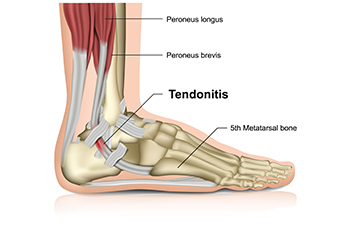Signs of an Achilles Tendon Rupture

The Achilles tendon is the longest and strongest tendon in the body, and its job is to absorb a great deal of stress. This tendon connects the muscles in the calf to the heel, allowing you to be active on your feet. A ruptured Achilles tendon is either partially or completely torn, which causes a popping sound and extreme pain behind the heel. This is a common injury to athletes, usually between the ages of 30 and 40, and is more common in men than women. Symptoms of a partially torn Achilles tendon include swelling and bruising at the heel, pain while walking up stairs or hills, and difficulty bearing weight. A fully ruptured tendon, however, stops you in your tracks and requires immediate medical attention. Healing from a ruptured Achilles tendon can take as long as six months. An ankle brace or walking brace is usually prescribed, and surgery may be required to mend the torn tendon. For more information on an Achilles tendon rupture, it is suggested that you consult a podiatrist.
Achilles tendon injuries need immediate attention to avoid future complications. If you have any concerns, contact one of our podiatrists of InStride Family Foot Care. Our doctors can provide the care you need to keep you pain-free and on your feet.
What Is the Achilles Tendon?
The Achilles tendon is a tendon that connects the lower leg muscles and calf to the heel of the foot. It is the strongest tendon in the human body and is essential for making movement possible. Because this tendon is such an integral part of the body, any injuries to it can create immense difficulties and should immediately be presented to a doctor.
What Are the Symptoms of an Achilles Tendon Injury?
There are various types of injuries that can affect the Achilles tendon. The two most common injuries are Achilles tendinitis and ruptures of the tendon.
Achilles Tendinitis Symptoms
- Inflammation
- Dull to severe pain
- Increased blood flow to the tendon
- Thickening of the tendon
Rupture Symptoms
- Extreme pain and swelling in the foot
- Total immobility
Treatment and Prevention
Achilles tendon injuries are diagnosed by a thorough physical evaluation, which can include an MRI. Treatment involves rest, physical therapy, and in some cases, surgery. However, various preventative measures can be taken to avoid these injuries, such as:
- Thorough stretching of the tendon before and after exercise
- Strengthening exercises like calf raises, squats, leg curls, leg extensions, leg raises, lunges, and leg presses
If you have any questions please feel free to contact our offices located in Concord, Charlotte, and Salisbury, NC . We offer the newest diagnostic tools and technology to treat your foot and ankle needs.
